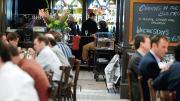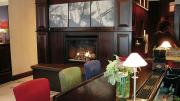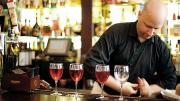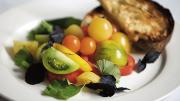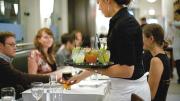The word bistro was coined in France for a small café or restaurant. In this country, its use has gradually expanded to apply to nearly any restaurant classier than a chain eatery and smaller than an airplane hangar. The Beacon Hill Bistro, nestled into the first floor of the boutique Beacon Hill Hotel (12 rooms, one suite) on Charles Street, returns bistro to its roots.
The hotel, for example, has no lobby, only a polished, wooden, curved front desk, hard by the dining room. A semicircular bar to one side seats only eight. There’s a fireplace (gas, unfortunately). To the left, the long, narrow dining room with a banquette and a row of tables seats 60. We were lucky enough to dine at the small corner table at the end of the banquette. With retro sconces, dark wood, and dim lighting, it was cozy indeed.
Beacon Hill’s ultimate redoubt, Louisburg Square, is less than five blocks away, and the Boston Common stretches out only a block’s walk down picturesque Charles Street. Here we are in one of the older parts of Boston, and the restaurant’s black-and-white tiled floors are true not only to the nearby brick townhouses but to the bistro tradition. Although Beacon Hill Bistro serves breakfast and lunch with an American/international flavor, its dinner menu leans toward the French, with an emphasis on local organic ingredients.
A delightful roasted beet salad with full-flavored farmer’s cheese, thyme, and shallot vinaigrette ($9) proved a bracing opener. The beets were sliced thinly, then stacked and packed together in a sizable, solid block with a soupçon of crème fraîche. Less prepossessing was a salad of yellow pear tomatoes and muskmelon, with basil, purslane, and a rather bland buffalo ricotta ($12); its vinaigrette lacked the oomph of the shallot-assisted alternative.
Our entrées stepped deliciously up to the plate. The boneless braised Yorkshire pork shoulder ($24) was the ultimate comfort food—it had heft, but the meat was delicate and tender. There was a nicely seared crust, and the sweet/savory cider raisin sauce was irresistible. A fragrantly herbal lasagna with glacéed vegetables and mustard cream sauce ($25) included carrots, radishes, kohlrabi, and celery root, plus such herbs as sage, calamint, and burnet. The flavors were so delicate that we could taste the pasta, and the cylindrical presentation, with a strip of pasta encircling the outside like the bark on a tree, pleased the eye.
A California Syrah (Clos LaChance, $10 per glass) boasted a complex structure and notes of vanilla. Less satisfactory was an edgy Alsatian Pinot Noir (Gérard Bertrand, $9.50), which had a bite worthy of an Alsatian—dog, not wine.
We rounded out the evening with caramel-poached peaches served with a delicate butter cookie and a dollop of vanilla-bean ice cream, made in-house. We’d enjoyed attentive service and an atmosphere conducive to conversation—i.e., without the deafening din of a big restaurant. Yes, small is beautiful.
